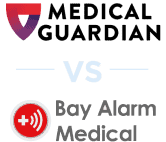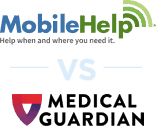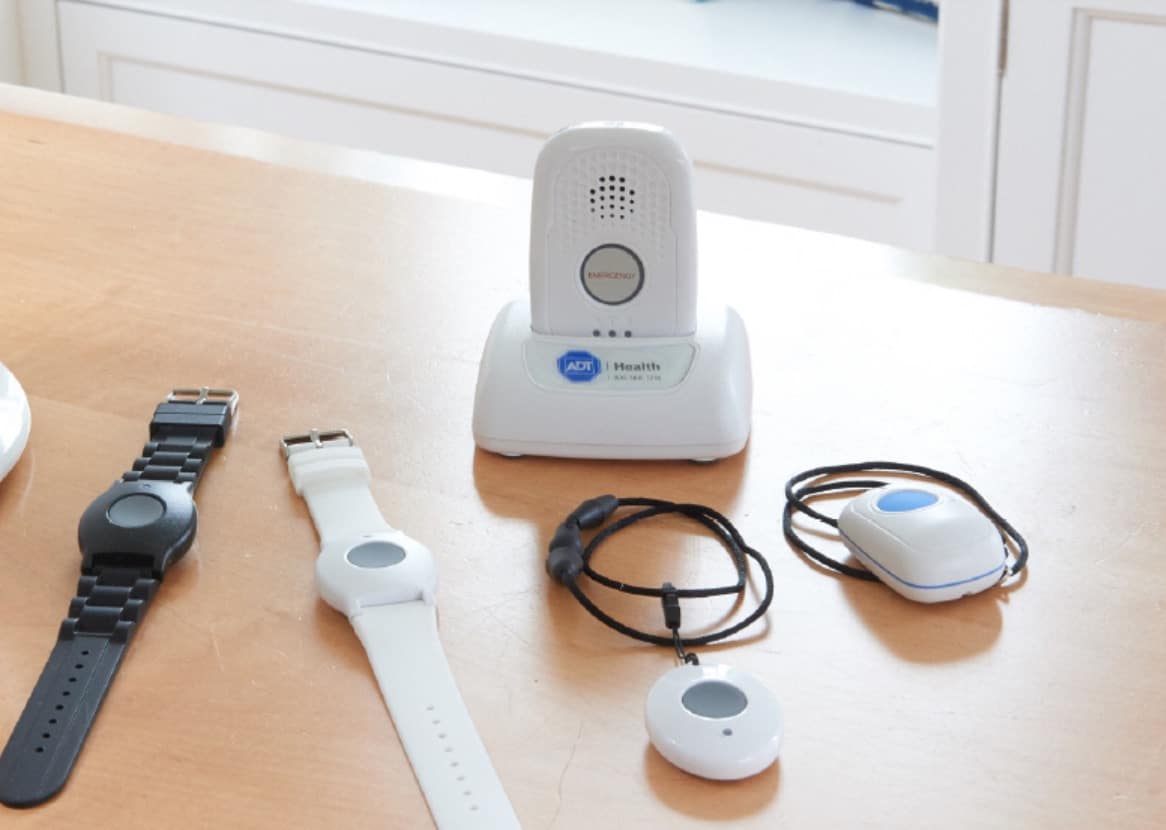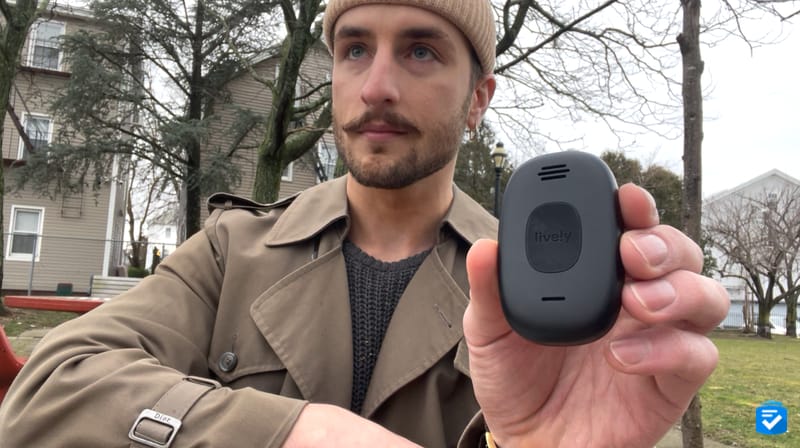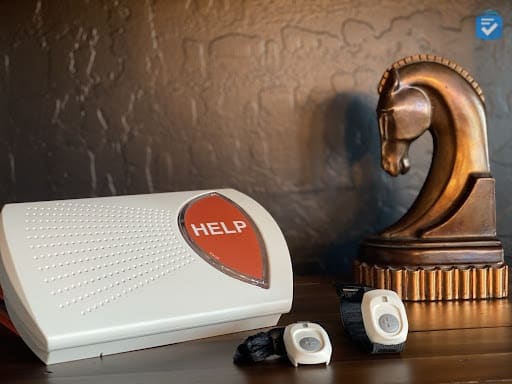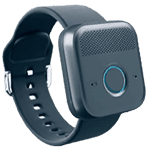
MGMini Lite Medical Alert Review

After extensive testing with Medical Guardian's medical alert bracelet, we've found the MGMini Lite to be a standout solution for seniors seeking reliable protection. What impressed us most were the MGMini Lite's consistently fast response times of just 10 seconds on average, and exceptional fall detection accuracy, which correctly identified 80 percent of our simulated falls.
While the system's monthly costs run higher than some competitors at $46.95 ($56.95 with fall detection), the reliable performance, comfortable wristband design, and comprehensive GPS tracking through the MyGuardian app provide substantial value. In this review, we'll examine the MGMini Lite's features, testing results, and pricing options, as well as how the device compares to similar medical alert systems on the market.
Key Findings
- The MGMini Lite connected us to help in an average of 10 seconds, faster than the vast majority of medical alert systems.
- The MGMini Lite's costs are higher than average, at $46.95 per month ($56.95 per month with fall detection).
- In our rundown of the best fall detection devices, the MGMini Lite performed the best, detecting 80 percent of our simulated falls.
FYI: Medical Guardian may be one of our favorite medical alert companies, but it’s far from the most affordable. To learn more, read our guide to the best medical alert systems.
Why Trust Us?
Our team of caregivers, experts, and health care professionals conducted over 5,000 hours of in-depth research and testing. The results helped us recommend the most reliable brands and devices. In this process, our team:
- Tested 50 medical alert devices from 15 different brands.
- Surveyed 1,250 seniors and caregivers on medical alert system usage.
- Consulted with nurses, EMTs, and caregivers who are experts at caring for older adults.
- Published dozens of videos that demonstrate our medical alert system testing.
- Evaluated verified customer reviews of medical alert companies from the Better Business Bureau.
- Continues to monitor developments in the world of medical alert systems and revises our findings accordingly.
How We Tested the MGMini Lite
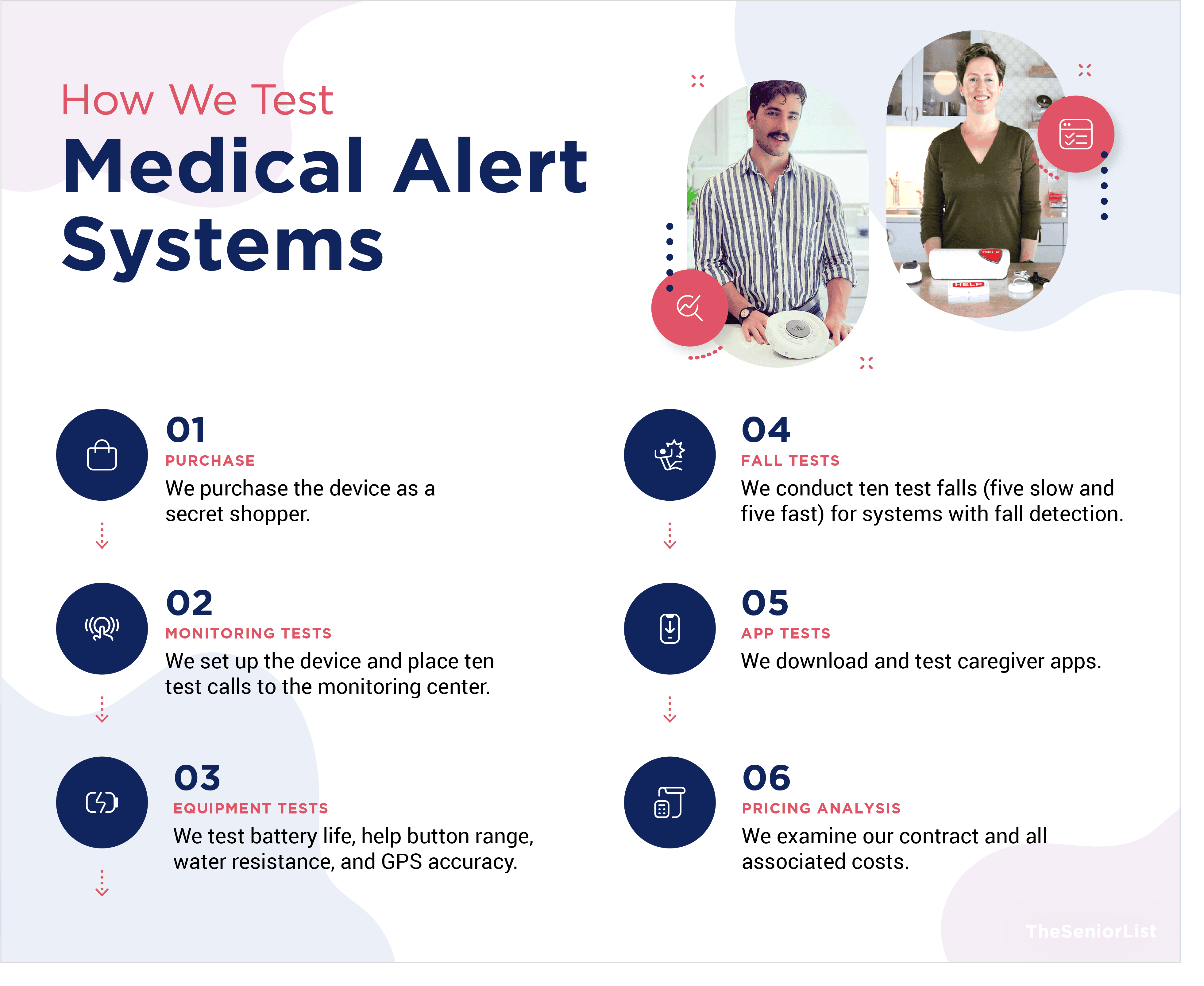
While Medical Guardian has multiple systems (read our Medical Guardian review to learn more), this review will focus on the MGMini Lite. Here is how we evaluated this mobile system:
- Response times: We placed 10 test calls with the MGMini Lite and calculated the average response time.
- Ease of use: Through testing and design analysis, we ensured that the device was easy to use, particularly for those with visual impairments and manual dexterity issues.
- Customer care: We conducted extensive interactions with Medical Guardian’s customer care teams and monitoring agents, ensuring that they offered adequate support.
- Affordable pricing: We examined the costs of the MGMini Lite and compared them to similar systems from other companies.
- Flexible contracts: We read the fine print of our Medical Guardian service agreement, ensuring there were no unexpected fees or obligations.
- Extra features: Apart from conducting test calls, we also tested the MGMini Lite’s fall detection, water-resistance, in-home range, GPS, and caregiver connectivity features.
Pros and Cons of the MGMini Lite
MGMini Lite Pros
- Simple controls: Unlike medical alert watches, which often contain many features, the MGMini Lite does not have touch screens, menus, or complicated controls. This made it easy to use.
- Accurate fall detection: It’s rare for a medical alert bracelet to have fall detection, and the MGMini Lite’s fall detection worked exceptionally well, detecting a majority of our simulated falls.
- Quick response times: As with other Medical Guardian devices, the MGMini Lite gave us quick access to response agents. On average, we waited 10 seconds for someone to answer our emergency test calls.
- Caregiver portal: When you purchase the MGMini Lite, you’ll get free access to the MyGuardian app. This app allows loved ones to track the device’s location and receive notifications when the user calls for help.
- IP67 water-resistance: The MGMini Lite can be worn in the shower without getting damaged, which is helpful considering that 80 percent of bathroom-related injuries are caused by falls.
MGMini Lite Cons
- No Wi-Fi: The MGMini Lite is powered by a 4G cellular connection. For those who live in an area with adequate cellular coverage, this will pose no problems; however, users in more rural areas might run into coverage issues.
- Higher price: Systems like the Lively Mobile Plus cost only $25 per month, but the MGMini Lite will run you $46.95. Fall detection also costs an extra $10 per month.

What Is the MGMini Lite?
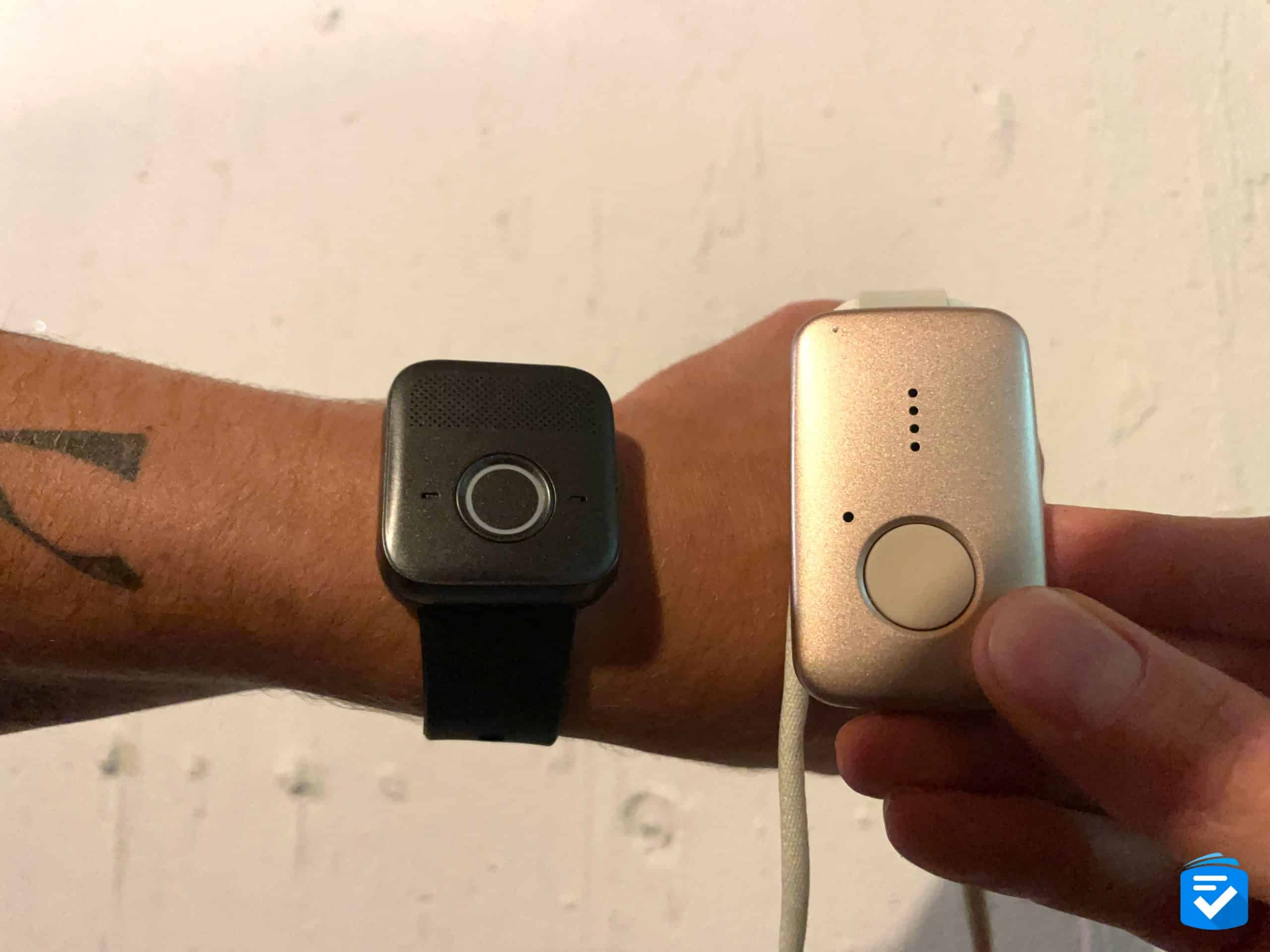
The MGMini Lite is a mobile medical alert system. Unlike other mobile medical alert systems, however, the MGMini Lite is worn as a bracelet rather than a necklace. That said, it works nearly identically to other mobile medical alert systems.
The MGMini Lite features a speakerphone and a call button. When you press the call button, the MGMini Lite calls the Medical Guardian monitoring center. A trained response agent will coordinate a response, whether it’s contacting first responders or your loved ones.
The MGMini Lite also features a built-in GPS, which allows response agents to pinpoint your exact location and send help to the right place. Through the MyGuardian app, your loved ones can also keep track of your location.
In most ways, the MGMini Lite works exactly like the Mini Guardian, another model from Medical Guardian. The main difference is how it is worn: The MGMini Lite is worn as a medical alert bracelet.
Pro Tip: Curious about Medical Guardian’s other devices? Read our full Medical Guardian review.
MGMini Lite Video Review
Want to see the MGMini Lite in action? Then watch our full video review.
Using My MGMini Lite Medical Alert System
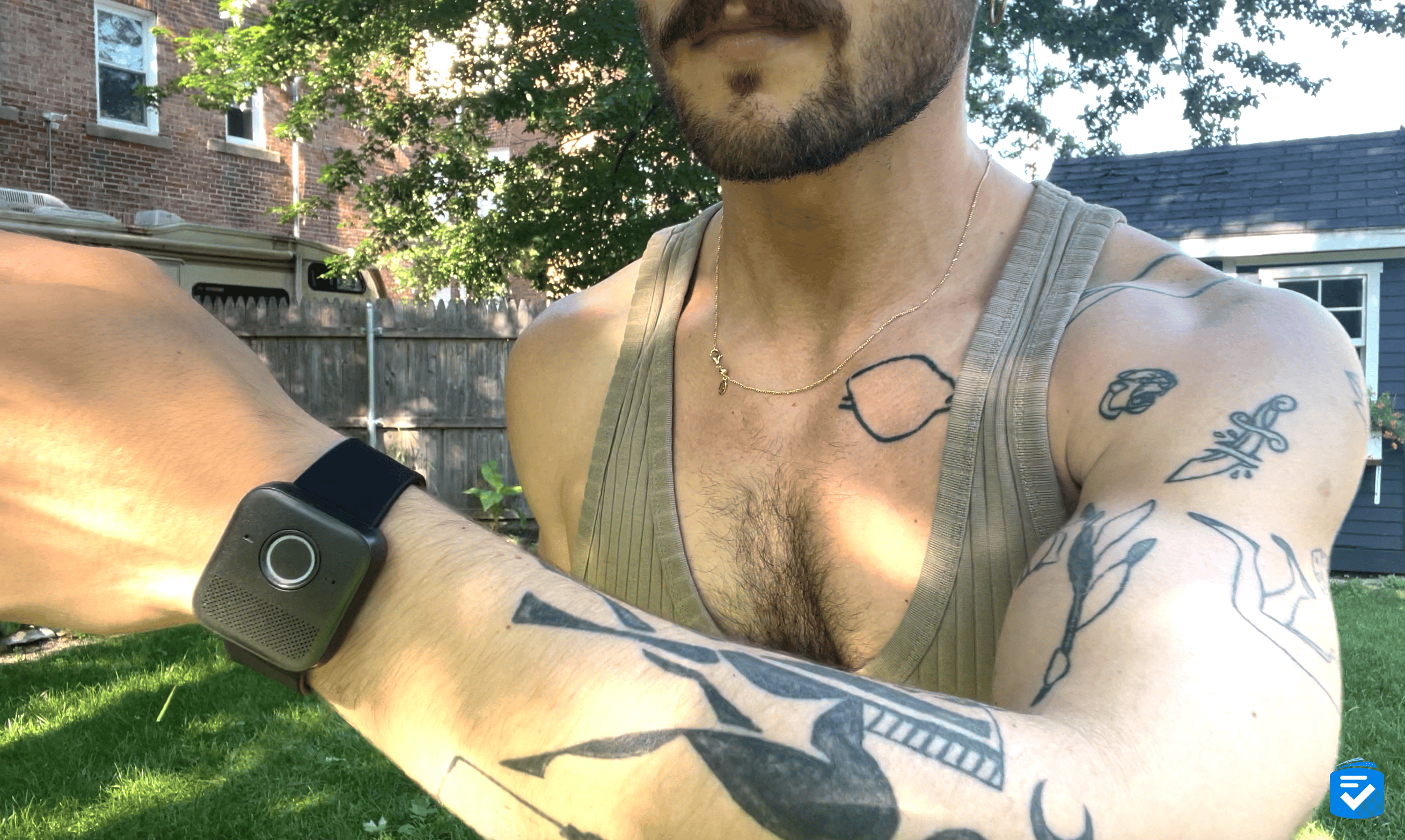
Upon receiving my MGMini Lite system, I opened the box and found the following:
- One MGMini Lite device, with an attached wristband
- One charging cradle
- One instruction manual
Installation
The first step to using my MGMini Lite was to charge it by placing it in the charging cradle. Once placed in the cradle, the device said, “charging,” and it glowed red. After roughly two hours, the red light turned blue, indicating my device was fully charged.
Once it was charged, I logged in to the MyGuardian app to activate my account. I also added a list of emergency contacts. That step is crucial, as it allows the Medical Guardian operators to contact family members instead of EMTs in a nonemergency event, should you press your help button.
I chose to activate my MGMini Lite online, but the entire process can be completed over the phone.
Testing My MGMini Lite
Once the MGMini Lite was live and charged, I began running tests. My first test involved pressing the device’s help button in my home. When I pressed the button, I received an immediate response from a virtual operator who confirmed that I intended to place a call. After confirming, the virtual operator connected my call to a live operator. The whole process took roughly 15 seconds.
FYI: Medical Guardian systems first connect you to a virtual operator, which helps cut down on false alarms if you press the button in error.
My next test was to leave my apartment, visit a nearby park, and run a similar test. My call was again answered in seconds, but this time I asked the operator to confirm my location. She did so through coordinates and cross streets, demonstrating the accuracy of my MGMini Lite’s GPS.
There’s no need for location tracking with a home medical alert system, since you’ll likely be making the emergency call from home. However, when using a medical alert system with GPS, the GPS needs to be accurate so first responders can pinpoint your location and provide help if you place a distress call outside your home. Because the MGMini Lite runs on Verizon’s 4G LTE network, it can go with you almost anywhere in the United States and function properly.
However, what underwhelmed me about the MGMini Lite was its battery life. In my tests, the device fully charged in only two hours but lasted only 36 hours on a single charge. It’s long enough to make it through the day, but other medical alert systems from Medical Guardian, such as the Mini Guardian, have much longer battery lives.
FYI: There are close to 3 million emergency department visits due to falls among older adults every year, according to the Centers for Disease Control. Approximately 37 percent of those who fall reported an injury that required medical treatment or restricted their activity for at least one day.
Fall Detection
One of the MGMini Lite's standout features is its built-in fall detection capability. Unlike many competing systems that require additional pendants or accessories, fall detection is integrated directly into the MGMini Lite wristband device.
During my rigorous testing, the MGMini Lite demonstrated impressive accuracy, automatically detecting 80 percent of simulated falls and promptly contacting the Medical Guardian monitoring center. The system performed exceptionally well with sudden, rapid falls, and detected all five of my simulated “hard falls” to the ground. However, its performance with gradual descents was less consistent. When I slowly lowered myself to the ground to simulate a gentler fall, the device only detected three out of five instances.
The MGMini Lite also includes a practical safety feature for false alarms. If the device incorrectly detects a fall (which happened several times when I accidentally dropped the unit), you can cancel the automatic call by simply holding down the help button. This prevents unnecessary calls to the monitoring center when assistance isn't needed.
While fall detection adds $10 to your monthly subscription cost (bringing the total to $56.95 per month), I consider it a worthwhile investment given its reliable performance and the additional peace of mind it provides.
Pro Tip: To learn more about fall detection, read our guide to medical alerts with fall detection.
MyGuardian App
As with other Medical Guardian devices, the MGMini Lite includes free access to the MyGuardian portal. Accessible through either a computer or smartphone app, MyGuardian allows loved ones to keep track of an MGMini Lite device.
That includes:
- Viewing a device’s location, battery life, and step counts.
- “Ringing” the device — that is, triggering a sound that helps you find a misplaced device.
- Scheduling reminders.
- Managing payments and extra features, such as fall detection, protection plans, and mobile alerts.
While these caregiver features are not as plentiful as those of an Apple Watch, I could imagine them being highly useful for caregivers. Simply being able to open an app and view a loved one’s live location is often enough to put any fears to rest. Additionally, the step counter can be a useful way to set and adhere to health goals. With studies finding that increased step counts are associated with decreased risk of cardiovascular disease, the MGMini Lite can help encourage overall wellness.

MGMini Lite Pricing
Medical Guardian costs tend to be middle-of-the-road compared to other medical alert devices. The company’s systems start at $31.95 per month, but the MGMini Lite comes at a higher cost. My MGMini Lite costs $46.95 per month and an additional $10 monthly for fall detection, bringing my total monthly costs to $56.95 per month. Additionally, I had to pay a one-time equipment fee of $149.95.
On a positive note, Medical Guardian does not require long-term contracts, meaning that when I finished testing my system, I simply canceled my service and stopped making monthly payments. Unfortunately, the $149.95 equipment charge is nonrefundable.
Medical Guardian also offers discounts for quarterly or annual payments. A yearly MGMini Lite subscription, for example, costs $515.40 or $42.95 per month. In addition to Medical Guardian’s website, MGMini Lite can also be purchased at Amazon, Best Buy, and Walmart; however, Medical Guardian will generally offer the best pricing on any of its devices.
MGMini Lite vs. Life Alert
| Feature | MGMini Lite | Life Alert Mobile Unit |
|---|---|---|
| Monthly Cost | $46.95 | $69.95 |
| One-Time Fees | $149.95 equipment charge | $197 activation fee |
| Contract Length | No long-term contract required | 3-year contract required |
| Response Time | 10 seconds average | 120 Seconds |
| Fall Detection | Available for $10 per month | Not available |
| Battery Life | 36 hours on a single charge | Up to 10 years (no charging required) |
| Caregiver Features | MyGuardian app with location tracking, battery monitoring, step counting | No caregiver app or portal |
| Wearing Style | Wristband | Pendant |
| Cancellation Policy | Cancel anytime with no penalty | Locked into 3-year contract with limited cancellation options |
When it comes to mobile medical alerts, both the MGMini Lite and Life Alert are popular options. Both provide access to help at home or on the go, but that’s pretty much where the similarities end. Medical Guardian’s response times are significantly faster than Life Alert’s. With Life Alert, we often waited upward of two whole minutes for a response agent to answer our calls.
The MGMini Lite is also slightly more affordable at $46.95 per month ($56.95 with fall detection), and there’s no long-term contract required. Life Alert’s mobile system costs $69.95 per month. You’ll also be locked into a three-year contract that can only be canceled through a user’s death or transition to round-the-clock care.
Life Alert also doesn’t offer fall detection or a caregiver portal that allows loved ones to keep track of the device. The GPS on Life Alert’s mobile unit works, but only the monitoring agents can access the device’s location.
The one advantage of Life Alert’s mobile unit is its disposable battery, which can last for years. (Thus far in my tests, it has lasted one year and seven months without needing to be changed.) The MGMini Lite battery, however, lasts for roughly 36 hours, after which you’ll need to recharge it.
To learn more about Life Alert, read our full Life Alert review and guide to Life Alert costs and contracts.
Final Thoughts on MGMini Lite
The MGMini Lite is one of the best mobile medical alert systems. Despite its lightweight and small size, it packs in caregiver tracking, GPS, and fall detection. Backed by Medical Guardian professional monitoring, the watch connected us with reliable help in each of our test calls.
I’d recommend MGMini Lite if you’re looking for:
- Simple controls: Unlike smartwatches, the MGMini Lite has minimal controls, a design choice that makes it easy for anyone to use.
- Small size: The MGMini Lite is 1.5 inches long and weighs 0.7 ounces, making it incredibly compact and easy to carry.
- GPS tracking: GPS location tracking is essential with a mobile medical alert device, and the MGMini Lite delivers accurate location reporting to both monitoring agents and people using the MyGuardian app.
- Reliable monitoring: Medical Guardian monitoring personnel responded to each of my calls within an average of eight seconds, one of the quickest response times I’ve seen from any medical alert company.
I wouldn’t recommend MGMini Lite if you want:
- Low monthly costs: MGMini Lite starts at $46.95 per month, and the price increases to $56.95 per month if you get fall detection. For more affordable options, check out my favorite cheap medical alert systems.
Compare Medical Guardian to Other Brands
MGMini Lite Frequently Asked Questions
-
What is MGMini Lite?
MGMini Lite is a mobile medical alert bracelet that uses Wi-Fi, cellular, and GPS capabilities to connect you with response agents who can view your exact location and send help in an emergency.
-
Is MGMini Lite waterproof?
MGMini Lite is rated IP67, which means you can wear it in a shower, bathtub, or even a pool and it will continue to function properly.
-
Are there any additional fees for Verizon cellular coverage with the MGMini Lite?
No, the cost of cellular service is included with your MGMini Lite subscription.
-
How long does the MGMini Lite battery last?
In our tests, the MGMini Lite lasted 36 hours on a single charge. Charging the device took roughly two hours.
-
How long does it take to set up the MGMini Lite?
Setting up the MGMini Lite is straightforward and typically takes 15-20 minutes. After unboxing, you’ll need to charge the device completely (approximately two hours for a full charge), create an account on the MyGuardian portal, and activate your device either online or by phone. The included instruction manual provides step-by-step guidance, and Medical Guardian’s customer service is available if you encounter any difficulties during setup.
-
Can multiple caregivers access the location tracking features in the MyGuardian app?
Yes, the MyGuardian app allows multiple caregivers to monitor a single MGMini Lite device. Each caregiver needs to download the app and create their own account, which the primary account holder can then authorize. All connected caregivers can view the device’s location, battery status, and step count data. They’ll also receive notifications if the emergency button is pressed or if the fall detection feature is triggered.
-
Is the MGMini Lite suitable for people with cognitive impairments like dementia or Alzheimer's?
The MGMini Lite can be beneficial for individuals with mild-to-moderate cognitive impairments, primarily due to its simple one-button operation and automatic fall detection capabilities. The GPS tracking feature in the MyGuardian app is particularly valuable for caregivers of people with dementia who may wander. However, users must still remember to wear the device and have the cognitive ability to press the help button in emergencies.

